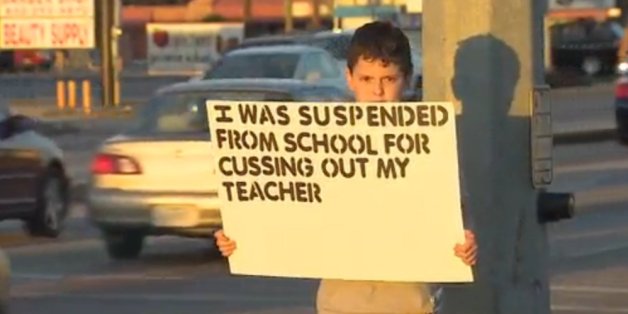Is Public Shaming Necessary?
The boy in the picture was publicly humiliated after being suspended from school. Photo credit: Huffington post
April 20, 2018
It isn’t quite hard to catch a picture or video on the internet of a parent publicly shaming their child for acting out. Whether it is a dad breaking his daughter’s laptop for posting inappropriate content, or a mom forcing her son to walk the streets of LA wearing a cardboard box that says “I am a thief” in big black bold letters, these are all examples of a new form of discipline called public shaming. In fact, public shaming became so bad in areas like Illinois that Governor La Shawn K. Ford had to propose a legislation to penalize parents who discipline their child online. Public shaming, as the name suggests, humiliates a person in public for his/her wrongdoings as a form of punishment. It is understandable that a parent might get frustrated at their child, still, public shaming is unacceptable. Salvador Martinez (11) understands that “a child should be disciplined, but [he doesn’t] think that public shaming is a necessary form of punishment.”
For one, public shaming will damage a young child’s confidence and mindset. According to a study by June Tangney of George Mason University, reprimanding a child at a public setting causes him/her to feel shame rather than guilt. As Fatherly described it, “shame is an emotion that makes you feel bad about yourself; guilt is an emotion that makes you feel bad about something you did.” Public shaming, surprisingly, had a contrary effect on young children. Instead of feeling ashamed of their actions, children had lower confidence and self- esteem. A girl from Tacoma, Washington even tried to commit suicide after her dad posted a picture of her long hair cut as a punishment for sending a boy racy pictures. The girl clearly needed to be disciplined, however public shaming proved to be unsuccessful. Not only does public discipline lowers a child’s confidence, it also creates a permanent record on the internet. Even if the parent wanted to delete the picture or video later on, the video may have already gone viral. As a result, the child may have a hard time getting a job or be isolated at school or work. The internet is a scary place. By publicly displaying one’s children on the internet, parents are, unknowingly, exposing their child to internet predators. These predators approach children with small self-esteem, and victims of public shaming are just what they are looking for. At school or work, victims of public discipline can also become victims of bullying. After all, anyone can view something that is shared online.
Disciplining your child doesn’t haven’t to be a traumatizing experience; there are alternatives that proved to be drastically more successful. Try actively listening to your child or creating small consequences for bad behavior such as chores.






































